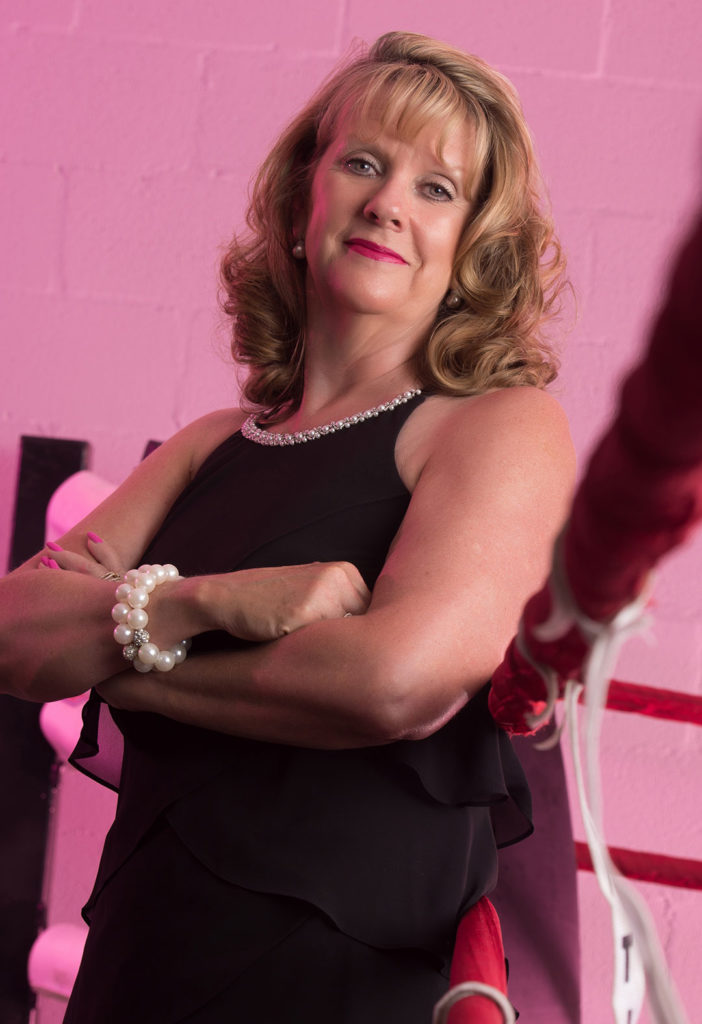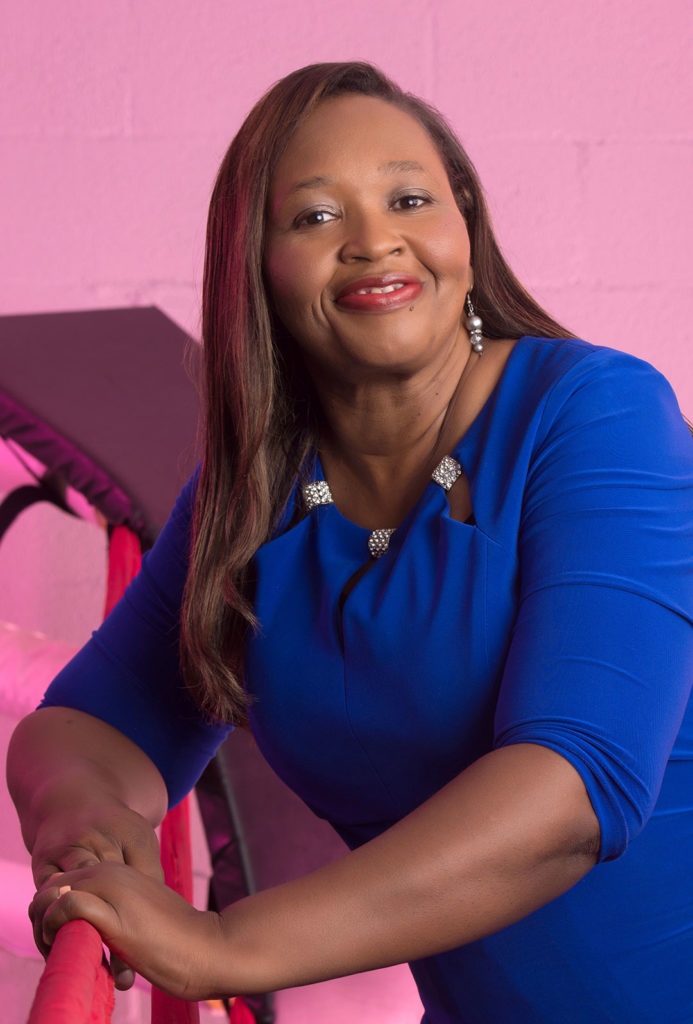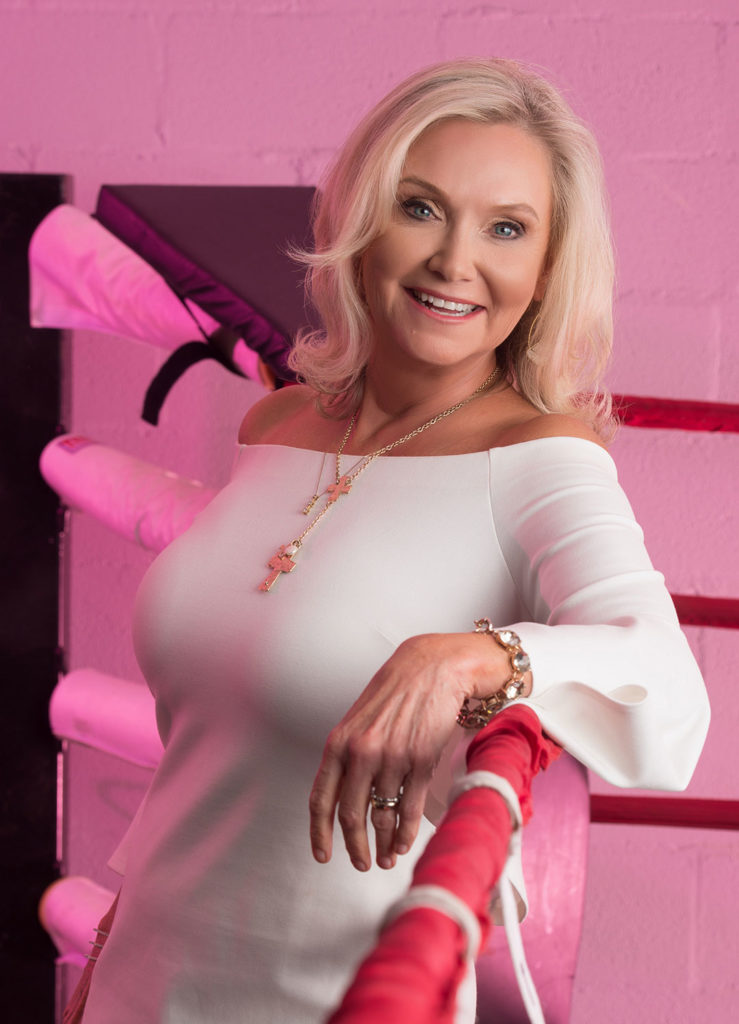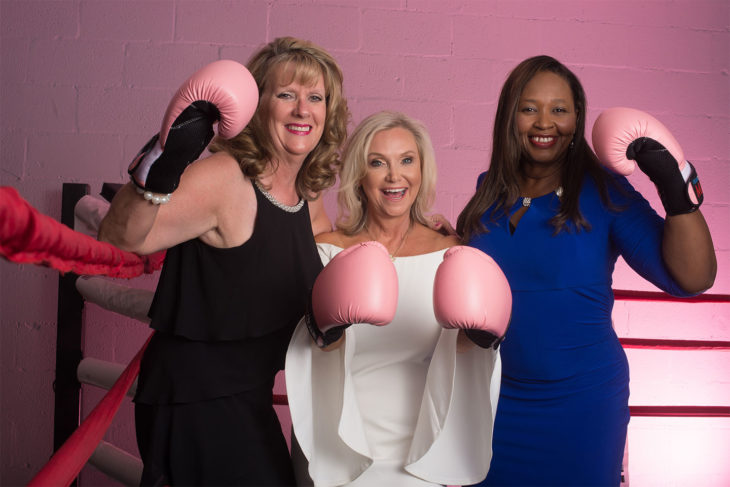She was determined Cancer wasn’t going to beat her

Being a breast cancer survivor does not define Margaret McKenzie.
There is no “before” or “after” cancer for her.
“It was a bump in the road and is now firmly in the rear view mirror. I am looking forward and focused on what’s ahead.”
In February 2014, an annual mammogram turned into a “real something.” She received a call later that day that there was “something” and needed a second test. There was “something” and needed a biopsy.
No big deal, she thought; she had had “somethings” before, a cyst or calcification. Not this time. It was a “real” something.
“When the doctor says cancer, it’s like getting a front row seat on an out of control roller coaster. You don’t know where it is going or when it is going to stop,” McKenzie says. “I never dreamed I would have breast cancer. No one in my family ever had. Of course, I learned (wow, did I learn a lot in a short period of time!) that only about 15 percent of breast cancer is hereditary.”
She feels blessed to have wonderful doctors at Lisolette Tansy Breast Cancer Center at Ochsner Medical Center in New Orleans. Her knights in shining armor, surgical oncologist Dr. Ralph Corsetti and reconstruction doctor Dr. Ali Sadeghi, stopped the roller coaster. She had a double mastectomy in March 2014.
“They gave me my life back. They gave me back ‘normal,’” she says. “Dr. Matthew McElveen and his staff in Slidell showed me that cancer was not just something to ‘survive but to conquer.
Of course, her true knight in shining armor, husband Duncan, was by her side the whole time. He had finished treatment for Hodgkin’s Lymphoma six months before her diagnosis. He was her inspiration to get through this and get on with her life, as he did.
“So that’s what I did. I started my chemo in June. Twelve days after my first treatment my hair started to fall out,” McKenzie says. “I had already gotten a wig, so I went in to have my head shaved. I told the hairdresser Michelle Engeseth, also my ‘wig lady’ I was not going to cry. I was going to have fun with it. She looked like she doubted my sanity but smiled and went along.
“I took the scissors and cut off the first few chunks. Very empowering! I couldn’t stop the hair loss, but I was going to be in charge. I then told her to shave both sides of my head because I wanted a Mohawk (there was that look again!).
“Duncan videoed the whole thing. We laughed and laughed. Would have been really funny, but he said it made me look like Justin Bieber. Out came the razor! No more Mohawk,” she says.
Looking back now, she knows how blessed she was. Her family and friends rallied around, and people she didn’t even know were praying for her. The best medicine there is!
“My dear friend Susan Jobst in Slidell, who had walked this walk a year and a half before me, held my hand through it and gave me answers to questions I didn’t even know to ask,” McKenzie says. “She was paying it forward.”
Of course, some parts of her life, like volunteer activities, had to be put on hold. With chemo, patients need to avoid germs because the immune system is weakened. She ended up spending much time at home.
“I couldn’t wait to get back to those things,” she says. “I needed ‘normal’.”
The best way for her to get back to normal was to maintain a strong faith in God, a positive attitude, and know that there was a light at the end of the tunnel. She kept her eyes on that light. Cancer wasn’t going to beat her.
“I learned everything I could about breast cancer and what to do to get better: diets, exercise, staying active (physically and mentally) and, whenever possible, paying it forward,” she says. “I was amazed at how many women I knew who were getting breast cancer diagnoses. It seemed like it was rampant. I was certainly no expert, but I shared what I had learned whenever I could.”
It is imperative that as women we learn all we can about our health and take proactive steps to protect it.
“I got my mammograms every year, but had no idea what to ask when they said ‘lump.’ I just never thought it would be anything but ‘normal.’ Bad assumption!” she says. “Educate yourselves, your daughters, every woman you love. Ask questions. Ask more questions. There is no dumb question where your health is concerned.”
Getting a second opinion is a must before making any decisions about treatment protocol. It doesn’t mean the first opinion was wrong, but there may be other options available. This happened to her and her husband.
There is a move to change the recommendations to women getting mammograms every three years instead of annually.
“Had I waited three years, I might not be here today,” she says. “My tumor was over two centimeters and had not been there just a year before. All of the medical professionals I have asked have stated their opposition to this change. We women need to fight for annual tests. They save lives, period.”
As for the future, well, that’s in God’s hands. She is doing whatever is in her power to live a healthy, active, positive life, giving back whenever she can. She spends time with what’s most important: family and friends, watching the grandchildren grow up and counting her blessings each and every day.
MCKENZIE’S ADVICE
- Ask what tests you need.
- Ask what the tests will tell the doctors.
- Ask how the tests affect treatment choices.
- The more you learn, the better decision you can make.
‘I prayed that I wouldn’t need surgery’

A serious diagnosis does not mean that life stops.
“Don’t let the disease take over your life,” says Kearn Cherry, owner of PRN Home Care and host of “The Unwrinkled Heart Caregivers’ Journey.”
Cherry lives with pulmonary hypertension, a rare lung disorder in which the arteries that carry blood from the heart to the lungs become narrowed causing the blood pressure in the pulmonary arteries to be extremely high.
“Initially, I was thinking this too will pass and I can get back to my life before,” Cherry says. “At some point, I realized that this disease was not going away. I could not work my way out of it. I could only pray.”
After much research, she learned that many don’t survive pulmonary hypertension. She is already living longer than many. This is a lifetime illness with no cure and also is misdiagnosed. She knew she was more fortunate than most.
In 2009, she was fearless and ready to take on the world. She not only owned her own company, but served as president and vice president of several boards. She was going to bed at 3 or 4 a.m. and heading out to meetings and networking events at 8 a.m.
At that time, she noticed that she was out of breath climbing a flight of stairs.
“Being on the Go Red for Women committee, I immediately checked the computer and looked up stroke signs,” she says. “Of course, I did not tell my family. Being a good husband, Dennis could tell something was wrong and offered to take me to the hospital. I finally gave in and went. Five days later they discovered that I had multiple blood clots in both lungs that had caused congestive heart failure.
She eventually was referred to cardiologists at University of Alabama, Birmingham. Her condition had a name — pulmonary hypertension. Several clots were blocking the flow of oxygenated blood to her heart and lungs. The doctors recommended surgery.
One of her worst fears had come true — open heart surgery.
Lots and lots of prayer let her maintain a positive attitude about her disease.
“Having some prayer warriors as friends doesn’t hurt either,” says Cherry, who is working on a more balanced lifestyle. “I prayed that I wouldn’t need surgery. It was tough because fear and depression can take over, but prayer helped to counter that. God intervened after preparing me mentally for heart and lung surgery and being admitted to UAB hospital. Surgery was canceled. My prayers were answered.”
The pace of her lifestyle has changed a bit. She now plans her work, volunteer and personal time more judiciously. On days when her oxygen level is low, she works in the office or on the computer. She tries not to stack several events on the same day, but if she does, she works a lighter day the next.
While she still doesn’t find time for vacations, she does rest more on Saturdays. She also is learning to decline some requests even though she is still on several boards because she enjoys them.
While her UAB doctors were unable to find the cause of her disease, she often thinks that if she wasn’t so sleep deprived and overworked, she could have avoided this.
“Sometimes your plans are not God’s plans for you. Work on getting your life in order,” Cherry says to those that simply do too much and fail to slow down. “I am still working on that and getting priorities in order. Make sure that God is first, family, business and then your friends. Events and social activities are a necessity, but they shouldn’t come before your health.”
CHERRY’S ADVICE
- Go online and learn about your disease.
- Don’t allow it to take over your life. Don’t stop living your life. You may need to make some adjustments, but sometimes that is the only way God can get our attention.
- Make sure to surround yourself with meaningful relationships.
Rockco: Listen to what your body is saying
by Andrea Yeager

Women need to care for themselves as much as they do for others.
Connie Rockco, Harrison County supervisor, District 5, found this out in 2002 when she was diagnosed with heart disease. She had one stint placed in the main left descending artery, which is better known as the widow maker and a second stint three or four years ago.
“I just have sticky blood,” she says. “My good cholesterol cannot remove the bad. She is now on a new medication called Repatha, which seems to be working.
Today, as a survivor, she cautions women to take care of themselves, to listen to their bodies and to be persistent with their health care providers.
“As women we tend to brush things off and ignore symptoms,” says Rockco, who is a former paramedic.
She was on a Mother’s Day weekend trip with her daughters in Gulf Shores when she first experienced a significant pain in her upper abdomen.
“There was no chest pain or numbness, so I thought I probably had a hiatal hernia,” says Rockco, who at the time was under much stress.
She was in Washington, D.C., during the 9/11 attack on the Pentagon and wasn’t able to leave for several days; her dad had recently died; she was finishing her first term as supervisor and in the midst of a re-election campaign, plus doing the “whole thing of life” with the family.
A trip to the doctor was not in the plan, so she put off that visit until she had another more painful attack where she couldn’t catch her breath. Her physician did not think this was heart-related but sent her to a cardiologist anyway.
She passed the stress test except for a small glitch when her heart rate got to a certain point. A heart cath was ordered because there was no sign of a hernia.
Her cardiologist said he would have bet 1,000 to 1 that her heart was perfect. She had no weight issues and appeared to be in excellent physical condition. His assumption was wrong; the artery was blocked, and a stint needed.
“I was 10 percent away from death,” says Rockco, who emphasizes that women’s heart disease symptoms are different than men’s. “A blocked artery is like driving a car without oil. A good friend from my high school years died from the same thing at 52.
“I guess God needed her more, and He had a lot more work to do on me,” says Rockco, who always believes that lemonade can be made from life’s lemons.
Her lemonade is simply teaching women the symptoms of heart disease and stressing women need to take care of themselves.
“After my surgery, I was on a crusade to tell women to pay attention to their bodies, and to take time for them,” she says. That second one, Rockco is still working on.Passionate to say the least, Rockco internalizes her stress.
Passionate to say the least, Rockco internalizes her stress. She has never learned to shuck off concerns, but she certainly does not want anyone to blow off health problems. Her daughter and family are tested for cholesterol to make sure they do not have heart disease. Her husband had bypass surgery in 2010.
“I was and still am on a crusade about heart disease,” Rockco says. “And in walks Becky Ginn, who was doing the first Go Red for Women seminar. She asked me to be the spokesperson.”
Even though her disease is hereditary, she believes that diet and exercise will help almost every situation. She certainly couldn’t change parents!
These days, Rockco avoids fried foods and eats lots of vegetables and fish. More important to her than diet is exercise, even though balancing exercise time with her hectic schedule is tough. She urges other women to eat right and exercise.
“I believe every suffering is a blessing,” she says. “I have gotten to talk to so many women about their health and to encourage them to take care of themselves. This is a blessing.”


